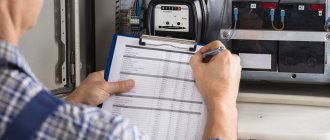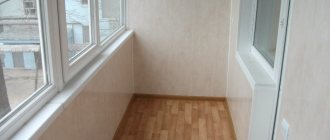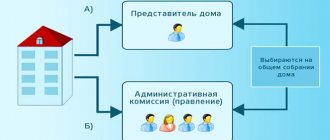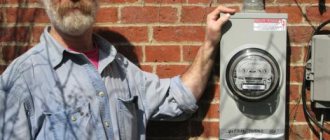What services are included in the apartment receipt?
The composition of the fee paid by residents is also determined by the code
The use of municipal housing, the maintenance of an apartment building, as well as the receipt of utilities by tenants and owners of premises is paid.
According to the Housing Code of the Russian Federation (hereinafter referred to as the Code), timely payment of housing and utility payments is an obligation of residents of private and municipal apartments.
The composition of the fee paid by residents is also determined by the code (Article 154). It includes the following elements:
- Payment for the rental (use) of housing (for persons occupying housing under a social tenancy agreement).
- Payments for the maintenance of housing (common property in an apartment building). This includes payment for utilities and ongoing repairs of an apartment building.
- Communal payments. They include payments for cold and hot water, electricity, heat, gas, solid fuel for stoves, wastewater disposal, and solid waste removal.
Only a sample form has been approved for the receipt; there is no single form for this document. Therefore, the appearance of payment cards may vary in different regions. But all these payments are reflected in receipts one way or another.
You should be aware that when filling out payment forms, abbreviations (abbreviations) are often used, so consumers do not always understand what they are paying for. For example, cold water supply (cold water supply), hot water supply (hot water supply), removal of solid waste (solid waste).
Giving and receipt for the apartment
“Zhirovka” is an outdated word and in general means an invoice for payment for any services, goods or interest on a deposit. In the Soviet Union, the term “zhirka” was used to mean a bill to residents for utilities, but now this term is almost never used and has been replaced by the word “receipt”.
In order to collect fees for housing and communal services and the maintenance of the house, owners and tenants of residential premises receive receipts (zhirki), the official name of which is payment documents. In total, residents receive seven main receipts each reporting period for the following services:
- garbage removal;
- cold, hot water supply and wastewater disposal;
- repair and maintenance of common property;
- electricity supply;
- heating;
- gas supply;
- major renovation.
In most cases, receipts for repairs and maintenance of the house, cold and hot water supply, as well as for heating are combined into one A4 document, on which three different personal accounts are indicated, then there are five receipts in total.
Residents of houses managed by housing associations may also receive additional receipts for payment of HOA membership fees for additional services.
The purposes of generating receipts in the accounting department of house management are:
- providing residents with reports on the procedure for accruals;
- collecting regular payments from residents;
- compliance with housing legislation.
Payment documents in paper form allow people who do not have access to the Internet and a bank account to pay for utilities, and paid receipts stamped by the management company or credit institution will help confirm a previously made payment in the event of failures in the electronic database of the management company.
Payment terms for receipts
Until what date can I pay utilities for an apartment? Payment for housing and communal services must be made on time. Otherwise, penalties may be applied to defaulters. The Code stipulates that payment must be made no later than the tenth day of the month following the month being paid.
Contracts for the management of apartment buildings may establish other terms. If the consumer does not know when to pay, they should look at the receipt. The form of this document usually indicates the deadline for making payment. Many payment orders indicate the need to make payment by the 20th of the next month.
It is important to consider that payments can be made in various ways. Therefore, the timing of receipt of funds from consumers also varies. Payment must be made so that it arrives on time, otherwise you will also have to pay penalties.
If documents on payment for housing and communal services have not been received, then the payer does not have to wait for them, but deposits the funds before the tenth day, as specified in the law. This will help consumers avoid being assessed late fees.
What to do if receipts did not arrive or did not arrive on time
Where to go if you haven’t received a receipt for your apartment? Payments by consumers are made on the basis of receipts received for payment of housing and communal services. However, they may not always arrive on time. A delay in the mail may result in the payment being due and still no receipt.
If the consumer sees that the payment has not been received, but there are several days left to pay, you can try to find out the amount yourself. To do this, you can use the following methods:
- call the organization involved in calculating payments, management company, homeowners association;
- clarify this information in the housing and communal services information system;
- You can also view the amount of accrued payments when paying for housing and communal services through Sberbank-online or other Internet banking systems.
Why does this happen
Sometimes it turns out that the rent payment receipt does not reach the owner of the premises. If such situations arise, you should contact the management company and request the required information.
If due to untimely delivery of the payment to the addressee there is a delay, the owner of the premises must independently take care of proving what happened due to the fault of the utility workers.
If the owner of the apartment does not have a payment for rent due to its loss, then the document can be restored easily and quickly by contacting your management company. In addition, information on the amount of rent arrears can be obtained from some large banks. But it’s still better to avoid losing your payment card, because in some situations it’s unlikely to be restored.
Late utility bills and liability for it
Non-payment of housing and communal services or late payments have adverse consequences for defaulters. They are provided for by law and may include:
- accrual of penalties for each day of non-payment;
- disconnection from consumed services;
- eviction from occupied housing.
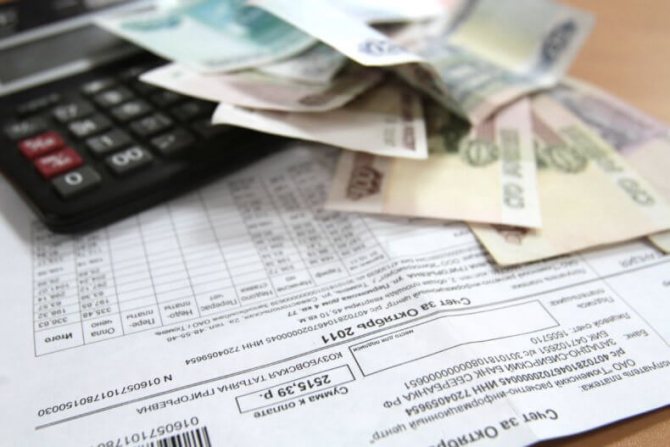
Non-payment or late payments have adverse consequences for defaulters
The amount of the penalty will depend on the period of delay. The Code establishes the following terms and amounts of penalties:
- until the 31st day of the prophets, penalties are not charged to the consumer of housing and communal services;
- from 31 days to 90 days 1/300 of the bank refinancing rate;
- from the 90th day - 1/130 of the bank refinancing rate.
The defaulter is notified of the amount of accrued penalties. The law does not allow collection of interest on top of penalties. Usually their size is indicated in the next payment document (receipt) for payment of housing and communal services along with the next payments.
If receipts for housing and communal services are not paid for more than three months, then some of them may be disconnected. Defaulters may be left without electricity, gas, or hot water. But you can’t turn off the heating, especially in the coldest season, cold water.
The consumer is notified in advance of disconnection from the resource (three days). During these three days, he has the last opportunity to pay the debt before being disconnected from the resource.
How many receipts should come for an apartment and what types of services should we pay for?
As many as there are open accounts.
Housing Code of the Russian Federation Article 154. Structure of payment for residential premises and utilities
1. Payment for residential premises and utilities for the tenant of residential premises occupied under a social tenancy agreement or a rental agreement for residential premises of the state or municipal housing stock includes:
1) payment for the use of residential premises (rental fee);
2) payment for the maintenance of residential premises, including fees for services, work on managing an apartment building, for the maintenance and current repairs of common property in an apartment building, as well as for cold water, hot water, electrical energy consumed during the use and maintenance of the common property in an apartment building, for the disposal of wastewater for the purpose of maintaining common property in an apartment building (hereinafter also referred to as communal resources consumed during the use and maintenance of common property in an apartment building). Major repairs of common property in an apartment building are carried out at the expense of the owner of the housing stock;
3) payment for utilities.
1.1. Payment for residential premises and utilities for the tenant of residential premises under a rental agreement for residential premises of a social housing stock includes:
1) payment for the rental of residential premises, established in accordance with Article 156.1 of this Code;
2) payment for utilities.
2. Payment for residential premises and utilities for the owner of premises in an apartment building includes:
1) payment for the maintenance of residential premises, including fees for services, work on managing an apartment building, for the maintenance and routine repairs of common property in an apartment building, for utility resources consumed during the use and maintenance of common property in an apartment building;
2) contribution for major repairs;
3) payment for utilities.
3. Owners of residential buildings bear the costs of their maintenance and repair, and also pay for utilities in accordance with agreements concluded, including in electronic form using the system, with persons carrying out the relevant types of activities.
4. Utility fees include fees for cold water, hot water, electrical energy, thermal energy, gas, bottled household gas, solid fuel in the presence of stove heating, fees for wastewater disposal, and solid municipal waste management.
5. In the case of direct management of an apartment building by the owners of the premises in the apartment building, in cases where the owners of the premises in the apartment building have not chosen the method of managing such a house or the chosen method of management has not been implemented, the payment for utilities includes payment for cold water, hot water , electric energy, thermal energy, gas, domestic gas in cylinders, solid fuel in the presence of stove heating, fees for wastewater disposal, management of municipal solid waste, including fees for utility resources consumed during the use and maintenance of common property in an apartment building home.
